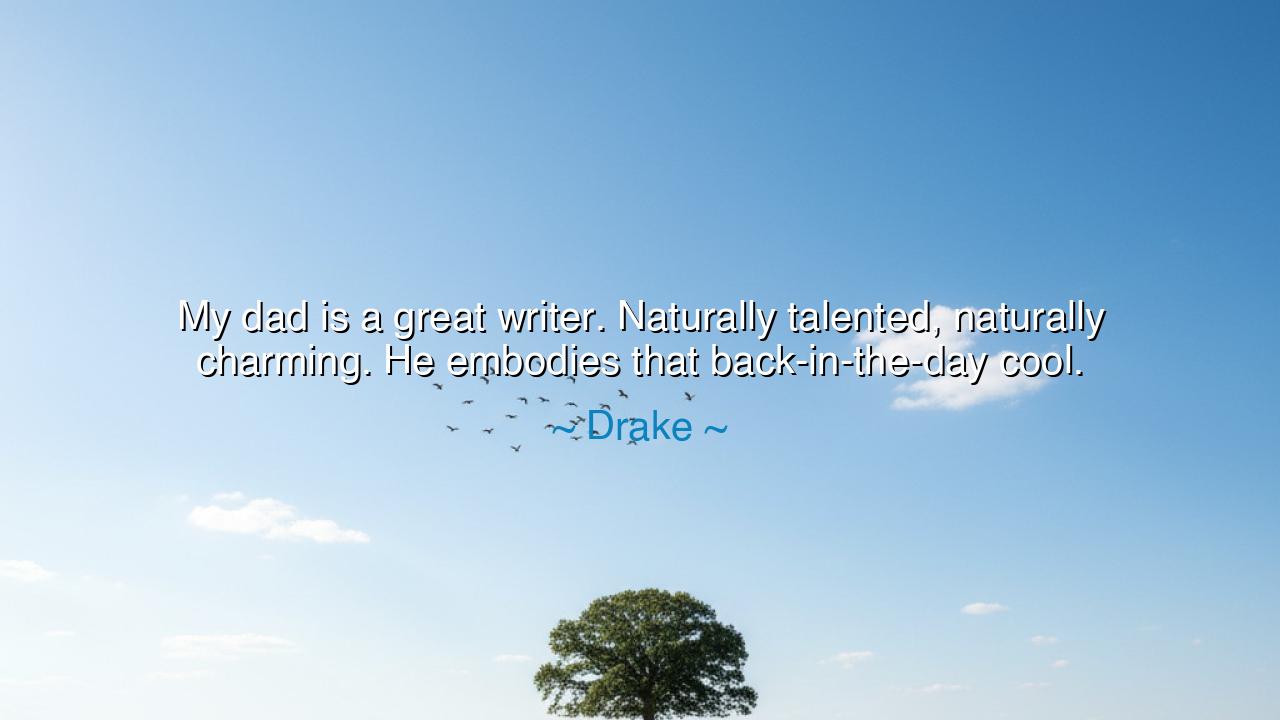
My dad is a great writer. Naturally talented, naturally charming.
My dad is a great writer. Naturally talented, naturally charming. He embodies that back-in-the-day cool.






"My dad is a great writer. Naturally talented, naturally charming. He embodies that back-in-the-day cool." These words, spoken by Drake, reveal a deep admiration and respect for the influence of his father. In his statement, Drake praises the natural talents of his father, describing him as someone who embodies an almost timeless charm—the kind of "cool" that seems to exist effortlessly, a product of both character and circumstance. In this humble recognition, Drake touches upon the larger themes of heritage, influence, and the continuity of greatness across generations. His words suggest that greatness is not only a product of individual effort but is also deeply rooted in the legacy handed down from one generation to the next.
To understand this sentiment fully, we must explore the nature of legacy itself. The idea of a father's influence on his child is as old as civilization. In the annals of history, we see countless examples of great men who passed down their wisdom, talents, and visions to their offspring. Consider Plato, the great philosopher, whose works shaped Western thought. His teacher, Socrates, imbued him with a passion for philosophy, and through his teachings, Plato was able to continue a legacy that would influence generations to come. Similarly, the talents and charisma Drake speaks of in his father are not mere happenstance, but part of a shared inheritance—a set of attributes that define the essence of a family’s legacy.
This idea of natural talent is not new to us either. Throughout history, there have been those whose gifts seem to be born with them, emerging without effort or conscious cultivation. Think of Mozart, whose musical genius was evident from a young age. His natural talent was nurtured by his family, especially by his father, who recognized the boy’s potential early on. Mozart’s story is a testament to the power of inheritance, not just of wealth or possessions, but of gifts, abilities, and passions. In this way, Drake’s admiration for his father’s natural talent echoes the ancient belief that certain qualities are passed from parent to child, shaping the course of their lives in profound and unspoken ways.
Drake’s reference to his father as someone who embodies "back-in-the-day cool" also highlights an important concept: the idea of timeless appeal. Coolness, as we understand it today, is often a fleeting thing, tied to trends and fads. But true coolness—the kind that stands the test of time—is born from authenticity, wisdom, and the quiet confidence that comes with experience. It is a quality that does not need to be chased or manufactured, but rather emerges organically from one’s self-assurance and unique character. The "cool" Drake speaks of in his father is not about trying to be relevant in the eyes of others, but about possessing a charisma that transcends time, much like the way the ancients regarded their elders—those who had lived through countless experiences and who carried with them a natural sense of dignity and wisdom.
Consider the ancient story of King David of Israel, whose life was filled with challenges and triumphs. His son, Solomon, inherited his father’s wisdom and leadership abilities, and despite his youth, became renowned for his own understanding and charisma. Solomon did not simply imitate his father; he embodied his wisdom in a way that made it uniquely his own. This passing down of natural greatness, not through force but through the quiet inheritance of talent and character, is what gives generations their true strength. In a way, this is what Drake sees in his father—an embodiment of grace and talent, not just in action but in the essence of who he is.
The lesson we draw from this statement is clear: the legacy we leave is not just about material possessions or titles, but about the values, talents, and wisdom we pass on. Just as Drake’s father has inspired him through his natural gifts, we too can inspire those who come after us by living authentically and fully, cultivating our talents, and nurturing the qualities that make us unique. The influence of fathers, mothers, teachers, and mentors is not always visible, but it is always powerful.
In practical terms, the actions we take today, the way we nurture our gifts, and the values we instill in others will leave a lasting impact on the future. It is not only the grand achievements that are passed on but also the smaller, quieter moments of grace and authenticity. Let us remember that our legacy is shaped not just by what we accomplish, but by how we carry ourselves and what we teach those who follow. In Drake’s reverence for his father, we are reminded that true greatness lies not only in the world-changing achievements but in the quiet influence of character, wisdom, and genuine talent passed from one generation to the next. Let us strive to live in such a way that our natural gifts are nurtured and shared, just as the ancients would have taught their children to do, creating a legacy that endures beyond our time.






AAdministratorAdministrator
Welcome, honored guests. Please leave a comment, we will respond soon